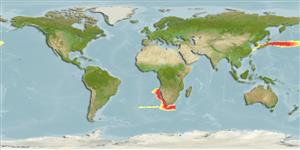>
Lophiiformes (Anglerfishes) >
Gigantactinidae (Whipnose anglers)
Etymology: Gigantactis: Greek, 'gigas' or 'gigantos' = gigantic + Greek, 'aktis' = ray (referring to the unusually long first dorsal-fin spine that functions as a lure in this genus) (Ref. 86949).
Environment: milieu / climate zone / depth range / distribution range
Ecologie
marien bathypelagisch; diepte 0 - 2000 m (Ref. 559). Deep-water
Southeast Atlantic: off Cape Town, South Africa. Northwest Pacific: Japan.
Grootte / Gewicht / Leeftijd
Maturity: Lm ? range ? - ? cm
Max length : 25.2 cm SL (female)
Korte beschrijving
Determinatiesleutels | Morfologie | Morfometrie
Dorsale zachte stralen (totaal) : 7; Anale zachte stralen: 6. Metamorphosed females distinguished by the following characteristics: length of illicium less than 120% SL; distal escal prolongation with spinules at base and several unpigmented, digitiform filaments on lateral margins; absence of escal papillae; posteromedial papilla at base of escal bulb and second on illicium below bulb; absence of proximal escal filaments; dentary teeth relatively long (longest 2.6-5.2% SL), in four or five longitudinal series; rays of caudal fin less than 30% SL (Ref. 86949).
Minimum depth from Ref. 58018.
Levenscyclus en paargedrag
Maturities | Voortplanting | Spawnings | Egg(s) | Fecundities | Larven
Masuda, H., K. Amaoka, C. Araga, T. Uyeno and T. Yoshino, 1984. The fishes of the Japanese Archipelago. Vol. 1. Tokai University Press, Tokyo, Japan. 437 p. (text). (Ref. 559)
Status op de Rode Lijst van het IUCN (Ref. 130435)
Gevaar voor de mens
Harmless
Gebruik door de mens
Tools
Speciale rapporten
Download XML
Internetbronnen
Estimates based on models
Preferred temperature (Ref.
123201): 0.3 - 10.8, mean 1.8 °C (based on 41 cells).
Fylogenetische diversiteitsindex (Ref.
82804): PD
50 = 0.5000 [Uniqueness, from 0.5 = low to 2.0 = high].
Bayesian length-weight: a=0.01995 (0.00906 - 0.04395), b=3.01 (2.83 - 3.19), in cm total length, based on all LWR estimates for this body shape (Ref.
93245).
Trofisch niveau (Ref.
69278): 4.2 ±0.7 se; based on size and trophs of closest relatives
Fishing Vulnerability (Ref.
59153): Low vulnerability (21 of 100).
